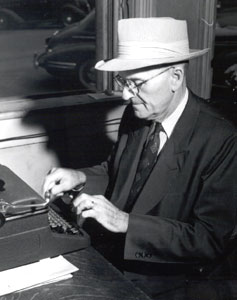
Jim Nance McCord
Governor, progressive agricultural reformer, publisher, and public official Jim Nance McCord was born in Unionville, Bedford County, in 1879. His parents, Thomas N. and Iva Stelle McCord, were farmers and the young McCord learned the value of hard work on the family farm. Striking out on his own at the age of seventeen, McCord was a traveling salesman for ten years. He learned about the needs and aspirations of rural Tennesseans as he honed a personable style grounded in his great skill and ease as a public speaker. In 1901 he married Vera Kercheval of Lewisburg, the Marshall County seat; they remained married until her death in 1953 and had no children.
In 1910 McCord began his newspaper career, during which he edited and published the Lewisburg Marshall Gazette and was chosen president of the Tennessee Press Association. Through the newspaper McCord became a spokesman for agricultural reform. In 1923-24 McCord strongly supported efforts by local officials to build and equip a Ladies Rest Room in downtown Lewisburg so country women would have a proper place to rest and eat during trips to town. Listed on the National Register of Historic Places, this building still operates as one of the few Ladies Rest Rooms in the country that is located in its original building. By this time McCord was in the midst of his long stint as mayor of Lewisburg, a position to which he was elected a total of thirteen terms in over twenty-five years of public service. He also was a member of the Marshall County Court for over twenty-seven years. During the Great Depression, his newspaper supported Franklin D. Roosevelt, and New Deal programs brought a new electrical system to Lewisburg as well as building a modern post office.
Extremely interested in the progressive effort to develop Tennessee livestock, especially Jersey cattle, McCord headed most local efforts at improving cattle breeds and served as president of the American Jersey Breeders’ Association, for which he also conducted cattle auctions. He also helped to convince federal agricultural officials to locate a U.S. Dairy Experiment Farm specializing in Jersey cattle on a five-hundred-acre tract south of Lewisburg. This facility is now part of the University of Tennessee’s Extension Service program. By the 1930s Lewisburg was a milk-producing center, with several large dairies in operation. In 1935 McCord played an important role in creating the official registry for Tennessee walking horses, records of which are still maintained in the Lewisburg headquarters. He was the first secretary-treasurer of the Tennessee Walking Horse Breeders Association of America.
McCord entered the larger arena of Tennessee politics in 1942, when he was elected the Fourth District’s U.S. congressman. He spent only two years in Washington before returning to Tennessee to run for governor. McCord served two consecutive terms from 1945 to 1949 and “earned a place as one of the strongest friends of education in the history of the state.” (1) In his first term McCord convinced the legislature to raise all basic appropriations for public education and to make a special $4 million appropriation to give every full-time teacher and principal a monthly raise of $25. The general assembly also set aside $500,000 in higher education funding to benefit returning war veterans eager to take advantage of the GI Bill. McCord also gracefully presided over the Sesquicentennial of Tennessee in 1946. Addressing the Tennessee Historical Society at the Hermitage Hotel in Nashville, McCord proclaimed: “[T]here are important lessons for us and our children to learn from the annals of the past. In these perilous days of controversy and contention, world-wide in scope, let us seek to indoctrinate our youth with the golden leaven of reason, justice and humanity.” (2)
For his second term, McCord envisioned further educational reforms and, recognizing more money would be needed, proposed a two percent general sales tax to better fund Tennessee’s schools. But Edward H. “Boss” Crump of Memphis, the undisputed kingmaker of Tennessee Democrats and McCord’s patron within the party, had always opposed a sales tax. McCord personally lobbied Crump to support the tax increase, though, and Crump grudgingly lent his support. The general assembly passed the sales tax as well as a state retirement law for teachers and other state employees. The legislature used the new sales tax money to significantly expand the infrastructure of public education. The revenues built new schools, bought new buses, and established the state’s first comprehensive minimum school program for grades one through twelve.
Despite the benefits of increased educational funding, the public never fully approved of the sales tax. McCord quickly found himself in political hot water, which only got hotter once he signed antilabor legislation calling for open shop, or “right to work,” rules in Tennessee. His support of the legislation greatly angered labor organizations. Faced by a formidable challenger in former Governor Gordon Browning, McCord failed to secure a third term as governor when he lost the Democratic primary to Browning in 1948.
After his defeat, McCord returned to Lewisburg and resumed his duties at the newspaper. He was a member of the 1953 state constitutional convention and served as commissioner of conservation under Governor Frank G. Clement. McCord died in 1967 and is buried in Lone Oak Cemetery in Lewisburg.



